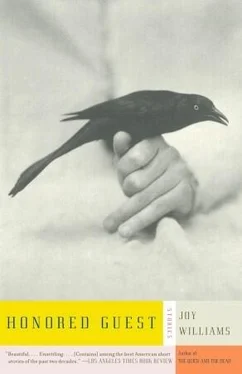The inn where we had taken lodging was now in sight. I thought once again of the debt I owe Pauline. I owe her everything I am. I would even prefer that she would leave this life, in time, before me, though I do not feel strongly about this. Even so, it is proof of her success with me that I could entertain such a thought. One of us will be first, in any case, and until then, we have each other.
ANGELA HAD ONLYone child, a daughter who abhorred her. Darleen was now sixteen years old, a junior in boarding school who excelled in all her courses. Her dislike of Angela had become pronounced around the age of eleven, increasing in theatricality and studied venom until it leveled off in her thirteenth year, the year she went off to Mount Hastings.
Darleen’s father had died in a scuba accident when she was but an infant. He had held his breath coming up the last twenty feet of an otherwise deep and successful dive. An absolute no-no. One did not hold one’s breath on the ascent to the light no matter how eager one was to return. He had been instructed in that, as had Angela and everyone else in the resort training course they’d been taking. While he’d been recklessly rising Angela had still been fooling around down in the depths, interesting herself in a rock that was in the process of being dismantled or constructed — it was hard to tell which — by colorful wrasses.
Angela had known few men after her impetuous young husband, whose name had been Bruce. She lived in the house she had returned to as a widow in the town she’d always lived in. Despite the dislike her daughter felt toward her, Angela was devoted to Darleen and awaited the day when their estrangement would be over, for surely that day would come. At the same time she feared that something would break then in Darleen, never to be made good again.
Ever since the girl insisted on going off to boarding school, Angela had worked as a masseuse in an old spa on the outskirts of town. She found the work distasteful and yet persisted in it, kneading and pummeling, rapping and slapping, the trusting hides presented to her. The old bodies became delusionarily flattered and freshened beneath her cool hands. Still, she was not as popular as the other masseuses. She spoke little and had no regulars. In her white cubicle on a white wooden table beside the high white-sheeted table was an envelope with her name written on it, a reminder that a gratuity would be appreciated. Seldom did it contain anything at the end of the day, though once an extraordinarily long and vigorously curling eyebrow hair had been deposited there.
On a cold morning in late February, Angela had a single appointment. She knew the woman, a wealthy and opinionated patron of the arts who was dedicated to social inclusion, moral betterment, sculpture in the parks and dance. She smiled at Angela thinly, disappointed that she was not being served by Margaret, everyone’s favorite. Outside the sky was dark, almost cyclonic, but inside a warm, optimistic light bathed everything. There was an orange on the table which really ought to be thrown out, and Angela left the room for a moment to dispose of it.
Midway through the session, just as Angela’s tape was about to end — it was Schweitzer playing Bach’s Fugue in G Minor, and she was dreamily placing the shaggy-haired theologian thumping away on an organ in the jungle, pulling out all the stops in a green and unreconciled jungle, which he was not doing at all of course — she snapped her prosperous client’s wrist bone, and before the ambulance arrived she’d been fired.
“I have no choice, Angela,” the manager said.
“What if the others signed a petition to keep me on?” Angela asked.
“They wouldn’t do that, Angela. They wouldn’t trouble themselves, you know that.”
“Oh, it doesn’t matter,” Angela said.
“Of course it doesn’t,” he said.
Angela did not return home that night. Instead, she drove to the coast several hours away and boarded a ferry that served a number of weedy, unremarkable islands that were popular with the very rich, who maintained large and hidden homes there. In the tiny lounge of the ferry, people were talking about a dog that had fallen overboard during the previous night’s crossing and had not yet been found. It was a chocolate-colored Lab named Turner. The owners, a young couple just married, were practically keening with distress, according to the purser. Angela stared at the water with the four other passengers. Occasionally, the ferry’s searchlight would cast a broad beam over the waves.
Angela checked into the inn closest to the ferry slip on the first island. She had come here before in times of distress, usually when she was trying to stop drinking. The following day, in her old wool coat and with a borrowed scarf over her head, she walked along the beach. The few people she encountered referred to the drizzle as mizzle, which had been more or less constant since New Year’s Day. Angela’s thoughts floated beside her. The vigorous eyebrow hair in the envelope appeared more than once, seemingly determined to show its jurisdiction over her most recent months. It had quite attached itself to Angela, though only in spirit, for she certainly hadn’t kept the damn thing.
When she boarded the ferry the next morning, people were talking about the brown Lab that had been rescued the night before, on the boat’s last run. He’d actually slipped below the waves just before they’d got a flotation ring around him. He was an instant from being gone but they’d hauled him in, and he’d smiled the way Labs do, pulling back his lips in a black, rubbery grin. After he’d been warmed and fed, the distraught couple had been called, and when the ferry returned to the mainland the three of them were reunited. But the couple said it wasn’t Turner. In their minds they had endured with Turner the weight of the stinging sea, the whipping of the starless dark, the bewilderment and despair that this animal too must surely have suffered. But this was not their Turner, and they were not going to take him home with them.
“I never saw a dog looked more like another dog in my life then,” the cashier in the galley was saying. “That Turner came in here three days ago with those people and he ate a fried egg sandwich.”
The couple apparently had been heckled off the boat.
“They weren’t crying anymore,” the cashier said. “They were stubborn about it, they’d made up their minds. It was the captain took the dog.”
Angela pressed herself against the rail and looked at the water in much the same way she had earlier, waiting for something to appear. This time she would be the first to glimpse it. There! she imagined herself calling out to the others. Though it was unlikely now. No, it would never happen now.
She drove home, detouring through the grounds of the old spa, which looked as ruined and complacent as it had when it was a big part of Angela’s life. Smoke rose from one of the chimneys. The fireplace in the game room frequently harbored a meager fire. The immense moribund pines, dying because of the town’s controversial road-salting practices, loomed protectively over the winding narrow road.
The phone was ringing as she opened the door. It was Darleen, who announced that she was arriving the next day for a brief visit.
“It would be thoughtful of you if you canceled your appointments at that vile place you work so we could spend some time together,” Darleen said.
“What would you like to do?” Angela said.
“I thought I’d help you put in a garden, Mummy.”
“I don’t have a garden, dear. There was never … I mean nothing’s changed much since you were here last.”
“I know the conditions under which you live, Mummy. I was just being annoying.”
Читать дальше












